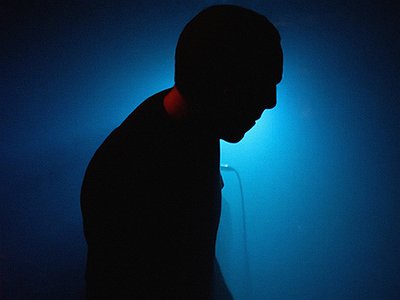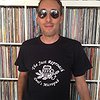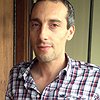Part 2
Tell us about your studio, please. What were criteria when setting it up and how does this environment influence the creative process? How important, relatively speaking, are factors like mood, ergonomics, haptics and technology for you?
I don't really have a studio per se which is why I usually work in 'professional' recording studios. I have a really basic set up at home where I can track some guitar stuff and prep mixes on pro-tools before I go to the real studio where all the other tracking, overdubbing and mixing takes place. I'm not interested in making records at home as they would end up sounding like pro-tools mixes where everything is bounced internally with that cliche pro-tools sound. My set up at home simply isn't good enough for what I want to achieve which is why I shell out the dough to work in an old-school studio with a desk, good mics, good recording rooms etc etc.
At the same time, having pro-tools on a laptop is super handy for prepping mixes and shaping recordings when I'm home and travelling. It's completely essential and I wouldn't be able to do any work without it.
What are currently some of the most important tools and instruments you're using? In which way do certain production tools suggest certain approaches, in which way do they limit and/or expand your own creativity? How do you see the role of sound designers and software programmers in the creative process?
I must state how important it is for me to have a great audio engineer to work with in the studio. Engineers such as Joe Talia and Randall Dunn are integral when I work on a piece. They are both like-minded and fun to collaborate with (working with an engineer is definitely a collaboration). I'm always interested in bouncing ideas and trying stuff out with them and they can be an excellent sounding board during this process. Randall for example pushes me to do stuff I might not think to do, I love his energy when we work together. This is important to me when time is of the essence. Joe has been an important element in shaping many of my mixes (as well as a key player on some of my pieces).
James Rushford and Eyvind Kang have been important collaborators, too, as they have arranged strings on some of my works, I love both of their takes on things and how they run with some of my ideas.
As far as important instruments/tools, the Leslie cabinet is definitely one of my favourite instruments, I am totally addicted to its sound. It's got the doppler effect, vibrato, tremolo, frequency modulation etc etc and it's all in an old-school cab that was built in 1941! It's a pure physical phenomena that you just can't generate in a space with an effect pedal. I first used one on my guitar when I was working on Sunn 0))'s Monoliths and Dimensions in Seattle many years ago. It was at this amazing studio called Litho and the cab was just sitting there, so I plugged into it and was immediately transfixed.
Some of my fave records from the late 60s/early 70s have Leslie's all over the guitars, I just can't get enough of that sound. I'm really not a computer musician so software tools etc are not my forte. I'm really infatuated with older recordings from the 70s/80s which really informs what I do on the production side of things when I record.
Many contemporary production tools already take over significant parts of what would formerly have constituted compositional work. How has this affected your own production process and its results? Are there any promising solutions or set-ups capable of triggering new ideas inside of you as a composer?
I tend to look at pro-tools in the way that I looked at my old double-tape recorder as a child or the Tascam 4-track that I had a little later on. It's an intuitive tool for shaping sound. I use it in a very basic way but I find it incredible that we can now achieve things that are relatively complex in such a fast and simple way. For example, being able to throw different tracks/elements that might not necessarily 'work' together in a mix in a matter of seconds can be a catalyst to trigger a new idea or be the clincher in how a piece evolves.
Could you describe your creative process on the basis of a piece or album that's particularly dear to you, please? Where do ideas come from, what do you start with and how do you go about shaping these ideas?
One key element that has always informed my work is starting off with recording a bunch of disparate ideas/layers and then slowly removing stuff until eventually, I arrive at the essence of what I'm going for. I love having a catalyst or an overriding concept that inspires me to get fired up and react to it via overdubs. Asking Joe Talia to play drums like Jack DeJohnette as fast and as long as possible was the catalyst for the piece 'Knots'. Everything I did was shaped around that. I like setting up situations like that which forces me to react in a way I wouldn't if I was just playing on my own. On my older releases, when I added other instrumentation, I was always reacting to my own guitar playing and now I'm setting things up so I'm reacting to other sounds. This seems to spur me on and forces me to go into territory I wouldn't think of. Quixotism began with Thomas Brinkmann's rhythms and this informed everything I did with that piece.
The earliest example I can think of this was my piece "Fever, a warm poison". Back in 2004 I did a studio session with Keiji Haino and Robbie Avenaim in Sydney. It was a crazy hot day (40 degrees) and we only had a few hours, so the session was really rushed. We ended up throwing the thing away. A few years later I began tinkering with one of the takes at home and ended up overdubbing my own guitars on top of Haino's original guitar track. I took it to the studio to do some more overdubs and possibly mix it. Haino's stuff was so dense that at one point the engineer said "I'm just going to turn Haino's track off for a minute". Once he did that there was so much space and everything seemed to breathe. It had such a weird aura about it as we were only listening to my reactions to Haino's track without him being audible. I started adding other instruments such as piano, tuned bells, percussion and the piece really came together. If you listen to it really closely at a loud volume you can hear some of Haino's original guitar track there as it bled a little onto the other tracks.
I do live for those 'eureka' moments in the studio when after the usual self-doubt and struggle somehow everything falls into place and you hit on something that is unexpected and a big development from your previous work. That feeling is quite addictive.
With more musicians creating than ever and more and more of these creations being released, what does this mean for you as an artist in terms of originality? What are some of the areas where you currently see the greatest potential for originality and who are some of the artists and communities that you find inspiring in this regard?
There's always been creative, innovative artists that continue to push themselves and challenge their audience and there's always been lesser, pale imitations. I don't think it's any different these days to what's taken place in the past. Personally, when I am working on something I do like to investigate sound that has a 'timeless' quality. Approaching sound and the material as a landscape. Exploring the concept of 'music as time'. Exploring a seemingly "simple" idea and exposing all of its details, nuances and hidden complexity over a extended period. Most importantly, if I feel that I can lose myself in the sound, then I know that things are 'working' for me. It's important for me to challenge myself and try and push into newer uncharted areas every time I work on a new solo release.
I've always been obsessed with music. It's like food and sustenance for me, I can't live without it. As a result I always need to discover new sounds and artists I'm not familiar with. If there's an artist I'm fond of, I love researching what they were listening to and what influenced them, who engineered their records etc. It can be quite a ridiculous and costly habit too of course, bordering on insanity. But I'm super passionate about it and "a fan". I can't really relate to other musicians who don't get excited about music - it doesn't make sense to me.
These days there are all kinds of artists in different areas pushing the envelope, be it in hip hop, improvised music, dance music etc. I am inspired by so much of this stuff but I do find myself always going back to the innovations from the past. There's something exciting about that sense of discovery and uncharted territory of some of the key older 60s/70s/80s releases that really blows my mind. For example, I love the fact that there was so much experimentation in pop music in the 60-70’s especially, which is taken for granted. The thing I love about it is that the experimentation is not what it’s all about, it’s not the focus, it’s just sort of hidden in there, but in the end it’s just a great catchy pop song. I don’t believe that just because there’s some experimentation, it makes it valid or it’s “cool”. It’s simply a great pop song, everybody can sing along to it, but if you really listen to it, there’s this all other stuff happening as well and that these two things are co-existing really interests me.
I’m really fascinated with production and how things are made and something can be really magical and mysterious, and ultimately I love that and I don’t want to question it too much, but it also interests me how it happened, who was involved, what were they influenced by, what techniques were used in the studio. I’m fascinated by studio techniques from the 70’s especially.








